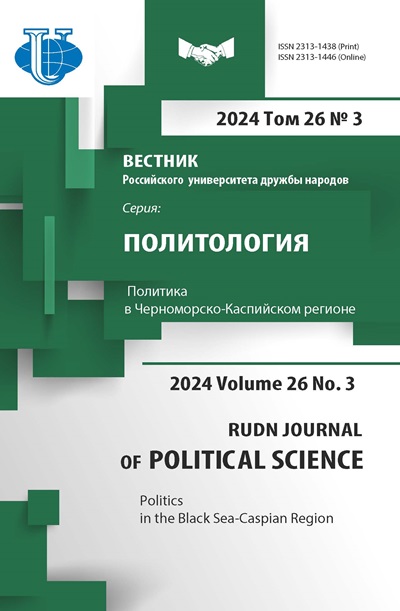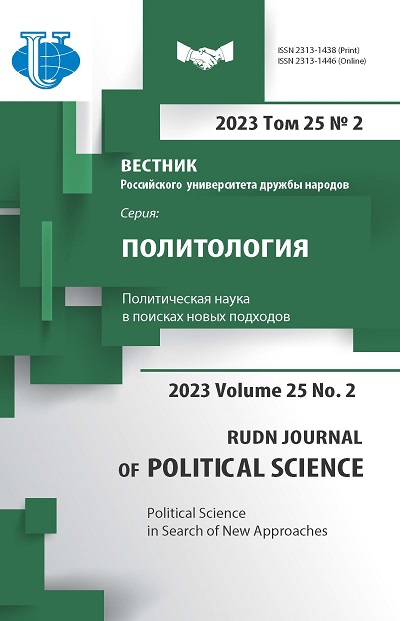“At home among strangers”: GR-management as political governance in the arsenal of “non-political” agents
- Authors: Degtyarev A.A.1
-
Affiliations:
- Moscow State Institute of International Relations
- Issue: Vol 25, No 2 (2023): Political Science in Search of New Approaches
- Pages: 348-367
- Section: POLITICAL PHENOMENA AND STRATEGIES
- URL: https://journals.rudn.ru/political-science/article/view/35155
- DOI: https://doi.org/10.22363/2313-1438-2023-25-2-348-367
- EDN: https://elibrary.ru/YYYTLQ
Cite item
Full Text
Abstract
The topic under consideration is still in the orbit of the domestic discussion of political scientists and specialists in Government Relations (GR). And there is no agreement among them yet regarding the subject field of the discipline being studied. Opinions differ, referring GR to applied political science, sociology of communications, or corporate management. This article analyzes the problems of defining the subject of GR-management as an applied political science discipline, as well as its categorical apparatus. The peculiarity of GR as a type of political management is that the goal-setting unit of the activities of GR managers and corporate lobbyists is located in an “internal” and “non-political” environment (economic, social, etc.), which may be associated with maintaining the competitiveness of the firm and obtaining economic profit by it. But the means to achieve these goals are already located in the “external” socio-political environment, in which the field of political behavior of interested actors is formed. And here we are faced with the phenomenon of “inversion” of the particular interests represented in public policy, when in order to promote them it is necessary to convert the goals of the economic strategy into adequate private issues when building a common public agenda, and into specific tasks of the strategy and tactics of an already special GR campaign.
About the authors
Andrey A. Degtyarev
Moscow State Institute of International Relations
Author for correspondence.
Email: andrew.a.degtyarev@gmail.com
ORCID iD: 0000-0001-8167-2092
PhD in Philosophy, Associate Professor, Department of Political Theory
Moscow, Russian FederationReferences
- Achkasova, V.A., Mintusov, I.E. & Filatova, O.G. (Eds.). (2021). GR and lobbyism: Theories and Technologies. Moscow: Urait Publishers. (In Russian).
- Almond, G. & Powel, B. (Eds.) (2010). Comparative politics today: A world view (9th ed.) Longman.
- Avnonomov, A.S. (2004). Azbuka of Lobbying. Moscow: Prava Cheloveka. (In Russian).
- Baron, D. (2013). Business and its environment. Boston: Pearson Education.
- Coen, D., Grant, W. & Wilson, G. (2010). Political science: perspectives on business and government. In Coen D., Grant W. & G. Wilson (Eds.). The Oxford handbook of business and government. (pp. 9–34). Oxford: Oxford University Press.
- Craig, S. (2009). Political science and political management In D. Johnson. (Ed.). Routledge Handbook of Political Management (pp. 42–56). New York: Routledge.
- De Fouloy, C. (2011). Fouloy’s Explanatory lobbying dictionary. Vilnus: AALEP Publishig Division.
- Degtyarev, A.A, (1998). Foundations of Political Theory. Moscow: Vyshaya Shkola. (In Russian).
- Degtyarev, A.A, Teteryuk, A.S. & Bondarev, M.D. (2018). Cyclical dynamics of the “external’ and “internal” environments of business organizations in GR-management. MGIMO Review of International Relations, 58(1), 63–93. (In Russian). https://doi.org/10.24833/2071-8160-2018-1-58-63-93
- Degtyarev, A.A. (2018). Contemporary GR-management as intersectoral governance area. In Ilyichyova, L.E. & V.S. Komarovskyi (Eds.). Subject-Matter Field of Economic Politology. (pp. 170–180). Moscow: Publishing House “Aspect-Press” (In Russian).
- Degtyarev, A.A. (2021). Complex modeling problem of “macro-micro conversion” transformation processes in socio-political actor’s behavior and “sphere inversion” activity of politicaleconomic organizations in сontemporary GR-analytics. In L.V. Smorgunov (Ed.), Russia and political order in the changing world: Values, institutions and perspectives (pp. 21–23). Moscow: MGIMO (In Russian).
- Lerbinger, O. (2006). Corporate public affairs: Interacting with interest groups, media and government. Mahwah: Lawrence Erlbaum Associates.
- Mack, C. (1997). Business, Politics and the Practice of Government Relations. Westport: Quorum Books.
- Mahon, J. (2017). Corporate issues management. In P. Harris & C. Fleisher (Eds.), The SAGE Handbook of international corporate and public affairs (pp. 534–549). London: SAGE.
- Markovskaya, E.I. (Ed.). (2017). GR: Interaction of business and power institutions. Moscow: Youright Publishers. (In Russian).
- Molchanova, O.P. (2016). Strategic management of non-commercial organizations. Moscow: Urait Publishers. (In Russian).
- Oberman, W. (2017). Lobbying resources and strategies. In P. Harris & C. Fleisher (Eds.), The SAGE Handbook of international corporate and public affairs (pp. 483–497). London: SAGE, 2017. London: SAGE.
- Peregudov, S.P. (2000). Big Russian corporation as socio-political institute (conceptual and applied study experience). Moscow: IMEMO, 2000. (In Russian).
- Peregudov, S.P. (2006). Russian corporation as public policy agent. Moscow: GU VShA Publishing House. (In Russian).
- Salorio, E., Boddewin, J., & Dahan, N. (2006). Integrating business political behavior with economic and organizational strategies. International Studies of Management and Organization, 35(2), 28–35.
- Solovyov, A.I., & Kupryashin, G.L. (2012). Public management: Theory and technologies. Moscow: MSU. (In Russian).
- Teteryuk, A.S. (2017). Experience of development of the model of structuring environment in the process of GR-management (as exemplified by pharmaceutical branch). Society and Power, 63(1), 87–94. (In Russian).
- Vikhanskiy, O.S. (1998). Strategic management. Moscow: Gardariky. (In Russian).
- Zinovyev, A.L., Morozov, S.A. & Morozova, E.V. (2003). Political management. Krasnodar: Kuban State University (In Russian).
















